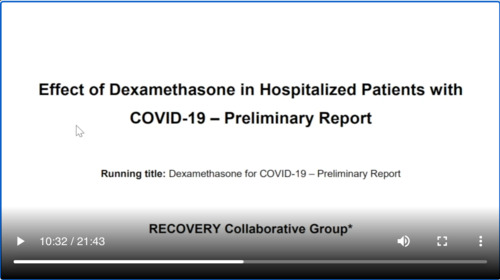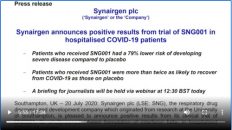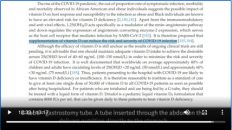Update 88: Dexamethasone History & Mortality Benefit Data Released from UK Trial
Medcram.com welcome to another medcram covid-19 updates. So in the United States while total daily cases start to go up daily deaths continue to go down. Although look here at the very tail end. We are starting to see maybe a little bit of a leveling off in terms of the daily deaths and we may be pulling back from that decrease that we see we have to watch this more carefully here over the next week or so.
Well, one of the things that may cause that death rate to go down hopefully is the recent discovery that dexamethasone may be a really helpful drug in the battle against covid-19. And this is a nature article that was published here at with update on the 23rd of June 2020 saying coronavirus breakthrough dexamethasone is the first drug shown to save lives. I think this is a really good article that goes through the history of this and talks about the recovery trial.
Why this is really a game changer and a landmark trial and you can see here in the UK. It says shortly after the results were released the UK government announced that it had immediately authorized the use of dexamethasone for patients hospitalized with covid-19 who require oxygen including those on ventilators the Chief Architect and chief investigator of the trial after Peter horn be an infectious disease specialist at the University of Oxford in the UK said it was a major breakthrough and as this article
Tackle describes the history of how we got to where we are right now. Let’s take a look at that in terms of where we were.
So if you remember back then every 15 to be exact there was an article in the Lancet titled clinical evidence does not support corticosteroid treatment for 2019 and the Covey lung injury and what this paper decided to do is went through the clinical evidence of previous trials against different viruses and tried to make some armchair decisions based on the best data that they had in terms of steroids with covid-19.
Of course. This was really early in the pandemic and Europe. Certainly Scotland wasn’t seeing a lot of these cases and you can see here in their table a summary of clinical evidence to date. They looked at MERS which is a relative of covid-19. And of course the first SARS Covey and they showed a lot of things that could cause problems with giving steroids for instance formers. They showed a delayed clearance of viral RNA from the respiratory.
Retract same sort of thing in SARS cup of one. We’re just SARS cup of there was the complication of psychosis diabetes avascular necrosis. Certainly. These are seen although rarely in a 10-day treatment with influenza. They actually had increased mortality for RSV. There was no clinical benefit and you can see here why they would come up with this conclusion that these type of steroids would not be of benefit and that’s exactly what the Lancet published.
Back in the middle portion of February and you have to realize that early on that really put the kibosh if you will on steroid use in any kind of covid-19 patients at least in the Western World apparently in China. They were using it in Japan they were using it and this caused a response. Well, the Lancet was good enough to publish a response to that article from some Chinese doctors that have been treating patients in China.
And they went through and they mention some problems with the data that they were using in that first opinion paper and they make a good point that sometimes Physicians will use steroids in the worst patients. And so it’ll get this association with bad outcomes. And they say that here they say as mentioned by the authors the studies referred to in the paper were mostly observational studies in clinical settings Physicians tend to use corticosteroids in the most critically ill patients there for selection.
Us and confounders and observational studies May contribute to any observed increased mortality in patient groups treated with corticosteroids. They go on to say that there are some studies that actually support the use of corticosteroids at low to moderate dose in patients with Chrono virus infection. They say for example in a retrospective study of 401 patients with SARS. That’s the first SARS virus in 2002 proper use of corticosteroids was found to reduce the mortality and shorten the length of stay in hospital for critically ill.
Patients with SARS without causing secondary infection and other complications they go on to conclude that corticosteroid treatment is a double-edged sword as we all know in line with the expert consensus. We oppose liberal use of corticosteroids and recommend short courses of corticosteroids at low to moderate dose use prudently for critically ill patients with 2019 and Covey pneumonia existing evidence is inconclusive and even systematic reviews and
Analysis on this topic reach different conclusions therefore in line with Russell and colleagues. We believe that there is a need for well-designed randomized controlled trials in the future to promote a more solid foundation for treatment recommendations and folks. This is where we stood in mid-January. Basically, there was a sense that corticosteroids at least in the Western World in patients with covid-19 was a No-No with an asterisks that it was going to be studied and we would see what would happen.
Well fast forward to the end of April of this year and you can see that there was a systematic review of the literature. This was published by a number of people from across the globe and they looked at basically for studies with 542 Chinese participants in the studies. And basically they found that two studies reported negative findings regarding the use of corticosteroids in patients with covid-19 that there was a detrimental impact on clinical outcomes and one study reported. No significant Association.
The use of corticosteroids and clinical outcomes. However, there was one study with 201 participants would different stages of pneumonia due to covid-19 that found that in more severe forms. So in other words on the ventilator perhaps and on high amounts of oxygen the administration of methylprednisolone, this is otherwise known as Solu-Medrol. This is not dexamethasone. This is another type of steroid significantly reduce the risk of death by 62% and the literature too.
Date does not fully support the use of routine corticosteroids in covid-19 at that point by the end of April, but some finding suggests that methylprednisolone or Solu-Medrol could lower mortality rate in more severe forms of the condition.
So with these mixed findings here, they concluded that the literature available so far does not fully encourage the routine use of corticosteroids and covid-19. But some findings suggest that methylprednisolone could lower mortality rate in more severe forms of this condition such as a RDS findings from future clinical trials that are ongoing are needed to better understand the role of corticosteroids in covid-19. And that’s where we stood at the end of April.
Fast forward just a little bit to the beginning of May and you have this not peer reviewed but published on Med archive study titled early short course corticosteroids in hospitalized patients with covid-19. And basically what they found here, is that a short course again of that same medication methylprednisolone of Solu-Medrol at 0.5 to 1 milligram per kilogram per day divided into two intravenous doses for three days. So again,
Lie about three days here showed that there was an improvement in the pre versus post corticosteroid group. What do I mean by that? They were so sure that they were going to have a good outcome that what they did here was that they basically treated these patients without steroids for some period of time and then when they decided to start treating them, they just basically started treating these patients and compared them to what their historical controls were before they started these so this was not a randomized controlled trial.
In any sense. However, it did look at a pre introduction of steroids versus a post introduction of steroids to see whether or not there be any difference and their fact there was a difference between these two groups. So as they say here they analyze 213 eligible subjects 81 or 38% of them and a hundred and thirty two or sixty two percent in a pre and post corticosteroid group respectively the composite endpoints occurred at a significantly
Lower rate in post corticosteroid group compared to the pre corticosteroid group in other words 34.9 afterwards versus 54.3 before they started the corticosteroids in their cohort group at their hospital and this treatment effect was observed within each individual component of the composite endpoint significant reduction in median Hospital stay was observed and the post corticosteroid group that was eight versus five days and a multi.
Varied regression analysis demonstrated an independent reduction in the composite endpoint at 14 days controlling for other factors. And so they concluded that an early short course of methylprednisolone or Solu-Medrol in patients with moderate to severe covid-19 reduced escalation of care and improve clinical outcomes. So this is where we were basically at the beginning of May of this year. And so here we are now at the end of June and we are seeing the release of the recovery trying
So think about the context of this this is not just a study that’s coming out of nowhere. This is not just a press release. This is not just another one of these studies that has really no basis, but it’s actually a slow March Of Studies that have shown some benefit in terms of corticosteroids. And now we have the randomized trial that shows that corticosteroids actually do improve mortality. But of course everybody’s asking well, let’s see the
Let’s actually see the data. Let’s have the peer review data and they’ve been waiting for this. Well, guess what today? We actually have a link to the data published on medical archive. And here it is. We’re going to give you a link to this so you can review it.
And let’s go to the results section 2104 patients randomly allocated to receive dexamethasone were compared with 4321 patients can currently allocated to usual care overall 454 patients allocated dexamethasone and 1065 patients allocated usual care died within 28 days adjusted ratio was .83 with a 95% confidence interval as listed the proportional and absolute mortality rate reductions.
Significantly depending on the level of respiratory support at randomization and there was three different groups and let’s go through those.
So again, we’re talking about the recovery trial and this is the dexamethasone portion of the recovery trial and they don’t just follow these people for a week or two. This was a 28-day follow up. So it’s not like you’re protecting them for a small amount of time and then they die. We’re looking at 28-day follow-up for mortality. So we’re looking at mortality numbers and you can see here in the first group those that were not on any Oxygen in the dexamethasone group versus the you
Care Group, the mortality rate was actually numerically higher than in the usual Care Group, but there was no statistical significance. So is dexamethasone a good medication to use for somebody with covid-19 who doesn’t need oxygen the answer is no it’s not a good medication to use it probably on some level inhibits the immune system enough that it may not be clearing the virus as well as it should be and so we can say at that point that there’s no
a role for dexamethasone in those that don’t require oxygen. So let’s look at those that require a low level of oxygen not requiring the ventilator here. There was a statistically significant difference because this P value is less than 0.05 where the mortality for those getting dexamethasone was 21.5% and usual care was 25% that may seem like a small number but that’s a difference of three and a half percent.
So if you have an absolute risk reduction of three and a half percent, the number needed to treat there is actually around 29, which means that if you treat 29 people you will actually save One Life by giving them dexamethasone and it’s a pretty inexpensive medication looking at the other data we can see here for those on the ventilator. So these are the sickest patients in the ones probably with the most cytokine storm. We can see here that those that were getting dexamethasone had a 20
nine percent mortality when compared to the usual care which was up to forty point seven percent that is a drop of 11.7% And if you look at an absolute risk reduction of 11.7% you’re talking about a number needed to treat their of 9. So in other words 9 ventilated patients, you give them all steroids at the end of all of that. You’ve got an additional life that you’ve actually saved.
So their conclusion was that in patients hospitalized with covid-19 dexamethasone reduced 28-day mortality among those receiving invasive mechanical ventilation or oxygen at randomization, but not among patients not receiving respiratory support. So where are the caches? Is there anything in this study that may give us a clue as to perhaps this study isn’t as strong as we thought if there is going to be something it’s usually in the methods or in the
So what did we see? Well, there are some little bits and pieces in the randomization that are interesting but I don’t think it negates the conclusions of the study. So they used a web-based randomization tool and they do say here that they used intravenous or oral dexamethasone for up to 10 days or until discharge if it was sooner and they say here that for some patients dexamethasone was I
They’re unavailable at the hospital at the time of enrollment or considered by the managing doctor to be either definitely indicated or definitely contraindicated and they said that these patients were excluded from entry in the randomize comparison of dexamethasone versus usual care and are not part of this report. So what are those patients where it would definitely be indicated? Let’s say a patient had a COPD exacerbation while one of the standards of care in patients who have COPD exacerbation ziz a trial of
Boyd’s, well what happens if the patient comes in with a secondary infection already and they have a covid-19 AR DS. It’s really not a good idea in a lot of cases to put patients on steroids if it’s going to cause a problem with a secondary infection. So it’s nice that those were excluded another little issue that I don’t think causes the conclusions to be put in disarray but is notable is that the randomly assigned treatment was prescribed by the treating physician.
And so participants and local study staff were not blinded to the allocated treatment. So this was not a random eyes blinded trial. This was a randomized controlled trial.
So the other question was why did they stop the study and open it and look at it and it was based here on the fact that they felt that if the 28-day mortality was 20% that a comparison of at least 2,000 patients allocated to active drug and 4,000 to usual care alone would yield at least a 90% power and a two-sided p-value of 0.01 that’s basically statistical talk to say that there will be enough patients in the study.
to see whether or not there will be a difference and so on the 8th of June 2020 the steering committee close recruitment to the dexamethasone arm since enrollment exceeded 2,000 patients and then they looked at the results one of the outcomes that I saw in addition to the results that we’ve already talked about is what happens to these patients that are not on the ventilator if they’re given dexamethasone are they less likely to go to a ventilator and the answer of course is yes, it makes
It’s sense that that would be the case since they have a lower likelihood of dying. But here we actually see the numbers and you can see here in the dexamethasone group 92 out of 1780 or 5.2 percent ended up on the mechanical ventilation versus the usual care were 258 divided by 3600 38 or 7.1% ended up on the ventilator and that was a risk reduction there as you can see 0.76 was the relative risk and that was
Least significant because that number is less than 0.05.
The other thing that you can notice if there’s going to be a problem is the randomization and the type of patients making up the study. So here let’s take a look. We see here that in the less than 70 the majority of these patients were in the less than 70 and in the greater than 70 we could see here that there was also some in the 7280 group and in the greater than 80 group. So this is I think a very good cross-section of the number of patients in the type of patients that we’re seeing also notice as we go across that the percentages here.
Are not that different and so I think there was good randomization. The other thing that also is looking like real world here is the difference between male and female you can see here that in both the dexamethasone and the usual care groups. The number of males is larger than that of females by almost a two-to-one margin and that kind of goes along with what we see in the hospital with covid-19 patients. I think one of the most interesting things that I found in the data here is look at this last
Column invasive mechanical ventilation now when we go down here to previous diseases. We see here. We have diabetes heart disease chronic lung disease tuberculosis, etc. Etc. Look at Chronic lung disease. I would have expected that out of all of these previous diseases. The one that would end up on the ventilator the most would be chronic lung disease and we can see here as we go through its 20% of the usual 22% 23% 23% but when we
At those patients that need invasive mechanical ventilation notice. It drops to 11 percent that is to me amazing that it’s those patients with chronic lung diseases that are in fact not showing up on the ventilator. This is very very different than what we expected at the very beginning of this pandemic when it was coming out what I was telling my patients by patients with chronic COPD and Asthma I was telling them that they were the ones that were at risk and indeed they could
Be the ones at risk but notice which ones are the ones that are ending up on the ventilators. It’s not those with the chronic lung diseases. Although there are some it’s those with diabetes. It’s those with heart disease. These vascular diseases are the ones that are predominating in the population that require mechanical ventilation.
And then finally when we look at the test results for SARS Covey to we’re seeing here about 81% of them being positive versus 10% being negative and 9% not yet knowing the test result at the time and I’m telling you this is not unlike what we are seeing in the real world. So when looking at these numbers, I don’t see anything here in this publication that would invalidate the results, but I
Love for you all to take a look at this and see if you can find something. That doesn’t look right. I think the data is interesting. The results are compelling and the conclusion definitive. We know from the ferritin levels the CRP levels the LDH levels the ESR levels on our patients with covid-19 in the hospital that this is an inflammatory disease particularly of the endovascular chur.
It’s not surprising to me that steroids helps in these kind of patience.
So for me, it’s going to be very interesting to see that as more and more hospitals adopt protocols and as more and more Physicians and nurse practitioners and physician assistants and health care providers start to get ahold of this data and start to implement steroid use in covid-19. What is going to happen to this seven day moving average of daily deaths, I think to the degree that there are a lot of places that
Are not using steroids at this point and to the degree that they’d switch over and start to use steroids in patients who require oxygen or mechanical ventilation. We could see a drop in the mortality rate further. Not only nationally, but globally and with that. Thank you for joining us.





Add comment